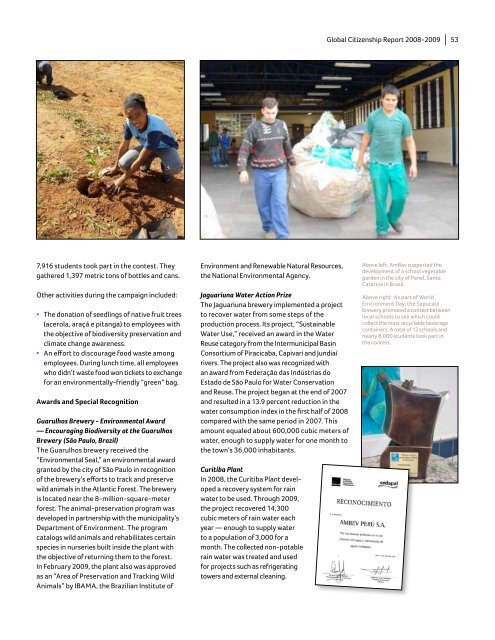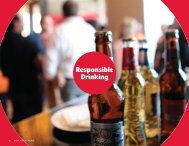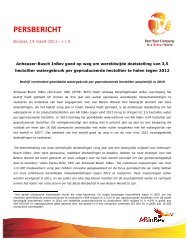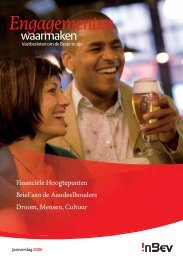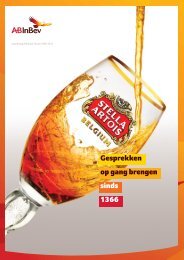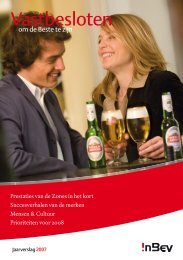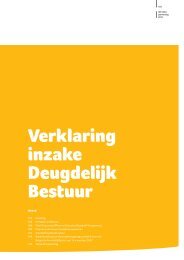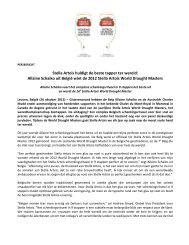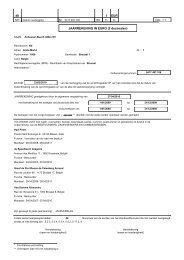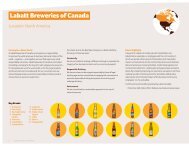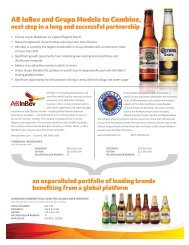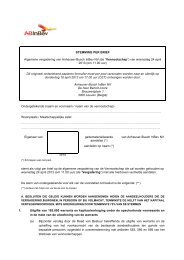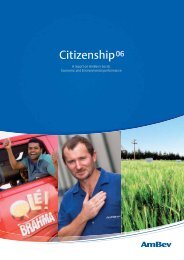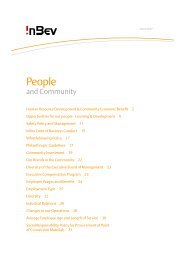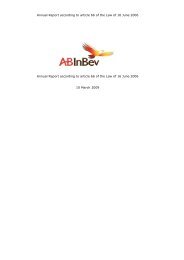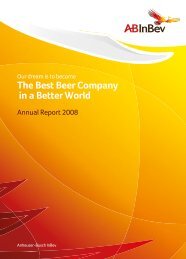Beer & A Better World - Anheuser-Busch InBev
Beer & A Better World - Anheuser-Busch InBev
Beer & A Better World - Anheuser-Busch InBev
You also want an ePaper? Increase the reach of your titles
YUMPU automatically turns print PDFs into web optimized ePapers that Google loves.
7,916 students took part in the contest. They<br />
gathered 1,397 metric tons of bottles and cans.<br />
Other activities during the campaign included:<br />
• The donation of seedlings of native fruit trees<br />
(acerola, araçá e pitanga) to employees with<br />
the objective of biodiversity preservation and<br />
climate change awareness.<br />
• An effort to discourage food waste among<br />
employees. During lunch time, all employees<br />
who didn’t waste food won tickets to exchange<br />
for an environmentally-friendly “green” bag.<br />
awards and Special recognition<br />
Guarulhos Brewery - Environmental Award<br />
— Encouraging Biodiversity at the Guarulhos<br />
Brewery (São Paulo, Brazil)<br />
The Guarulhos brewery received the<br />
“Environmental Seal,” an environmental award<br />
granted by the city of São Paulo in recognition<br />
of the brewery’s efforts to track and preserve<br />
wild animals in the Atlantic Forest. The brewery<br />
is located near the 8-million-square-meter<br />
forest. The animal-preservation program was<br />
developed in partnership with the municipality’s<br />
Department of Environment. The program<br />
catalogs wild animals and rehabilitates certain<br />
species in nurseries built inside the plant with<br />
the objective of returning them to the forest.<br />
In February 2009, the plant also was approved<br />
as an “Area of Preservation and Tracking Wild<br />
Animals” by IBAMA, the Brazilian Institute of<br />
Environment and Renewable Natural Resources,<br />
the National Environmental Agency.<br />
Jaguariuna Water Action Prize<br />
The Jaguariuna brewery implemented a project<br />
to recover water from some steps of the<br />
production process. Its project, “Sustainable<br />
Water Use,” received an award in the Water<br />
Reuse category from the Intermunicipal Basin<br />
Consortium of Piracicaba, Capivari and Jundiaí<br />
rivers. The project also was recognized with<br />
an award from Federação das Indústrias do<br />
Estado de São Paulo for Water Conservation<br />
and Reuse. The project began at the end of 2007<br />
and resulted in a 13.9 percent reduction in the<br />
water consumption index in the first half of 2008<br />
compared with the same period in 2007. This<br />
amount equaled about 600,000 cubic meters of<br />
water, enough to supply water for one month to<br />
the town’s 36,000 inhabitants.<br />
Curitiba Plant<br />
In 2008, the Curitiba Plant developed<br />
a recovery system for rain<br />
water to be used. Through 2009,<br />
the project recovered 14,300<br />
cubic meters of rain water each<br />
year — enough to supply water<br />
to a population of 3,000 for a<br />
month. The collected non-potable<br />
rain water was treated and used<br />
for projects such as refrigerating<br />
towers and external cleaning.<br />
Global Citizenship Report 2008-2009 | 53<br />
Above left: AmBev supported the<br />
development of a school vegetable<br />
garden in the city of Panel, Santa<br />
Catarina in Brazil.<br />
Above right: As part of <strong>World</strong><br />
Environment Day, the Sapucaia<br />
brewery promoted a contest between<br />
local schools to see which could<br />
collect the most recyclable beverage<br />
containers. A total of 12 schools and<br />
nearly 8,000 students took part in<br />
the contest.


